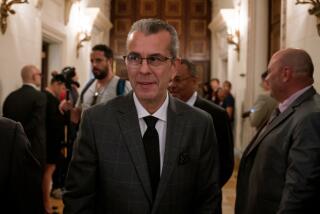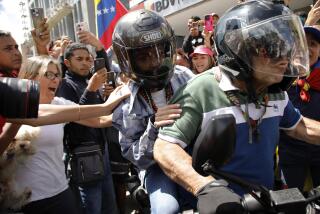Reformers Dispute Iran’s Vote Results
TEHRAN — Two reform candidates angrily challenged the results of Iran’s presidential election Saturday, charging that hard-line factions manipulated the vote in favor of the conservative mayor of Tehran, a former member of the Revolutionary Guards with limited political experience.
At a raucous news conference, third-place finisher Mehdi Karroubi claimed that conservatives had denied him his rightful place in a runoff election between the top two vote-getters, scheduled for Friday.
Another reformer echoed the complaint. Mostafa Moin had been considered a likely challenger to the front-runner, former President Hashemi Rafsanjani, but finished a disappointing fifth out of seven candidates.
After a day of sometimes contradictory information, election officials confirmed late Saturday that Tehran Mayor Mahmoud Ahmadinejad had come in second, only 1 1/2 percentage points behind Rafsanjani. The former president, a 70-year-old centrist, will face the 49-year-old Ahmadinejad in the first presidential runoff in the 26-year history of the Islamic Republic.
Rafsanjani, a onetime confidant of the late Ayatollah Ruhollah Khomeini, has spoken of the need for greater engagement with the United States.
Ahmadinejad, who was an unknown when he was tapped to run Tehran’s city government two years ago, has said better relations with the United States are not a priority. He has also been quoted as ruling out any retreat by Iran from its nuclear program, which the country says is for peaceful purposes. The United States and the European Union say Iran is attempting to acquire nuclear weapons.
“Access to nuclear technology is an inalienable right of Iran, and the world ought to recognize our rights,” Ahmadinejad has said.
Moin’s finish came as a bitter disappointment to followers and aides, who were counting on him to build on the policy of gradual liberalization carried out for the last eight years by incumbent Mohammad Khatami. A campaign aide to Moin spoke darkly of a “coup d’etat” being carried out by the Revolutionary Guards and the Council of Guardians, a conservative group of Islamic legal scholars and lay jurists that oversees elections and decides who can run.
At Karroubi’s chaotic news conference, where reporters and photographers tripped over one another and scuffled as they vied for position, Karroubi announced that he was sending an appeal to the country’s supreme leader, Ayatollah Ali Khamenei, to review the election.
Iran places ultimate power in the hands of the clergy, and Khamenei has broad powers to command the armed forces, declare war and dismiss the president at the request of the legislature or Supreme Court.
Religious hard-liners were able to use the power given them by the Iranian system to stymie reforms during Khatami’s second term in office.
“There has been bizarre interference. Money has changed hands,” Karroubi said. He claimed to have proof for his charges, but he did not produce it at the news conference.
Meanwhile, he asked supporters to avoid public demonstrations. And just days after President Bush had sharply questioned the fairness of the election, he said that any foreign governments’ comments on the dispute would not be helpful.
Tehran residents, still waiting for the official results, went back to work Saturday, a hot, summery day. The streets were jammed, and motorcycles dodged in and out between the cars. Shops were open, and newsstands were full of colorful papers carrying pictures of the candidates.
Ahmadinejad had been rated an extreme dark horse going into the election based on the country’s admittedly unreliable opinion polling, but it was difficult to evaluate whether the reformers’ complaints were valid.
During voting Friday, reporters noted that many people talked positively of the mayor, especially in poor and working-class areas.
Although regarded as an extreme hard-liner in the affluent north of Tehran, he had emerged as a favorite of the “bazaaris” in the south of the city, the workers and shop owners who had provided the shock troops for Khomeini’s Islamic Revolution in 1979.
Conservatives said Ahmadinejad did well because of his piety and his simple, sincere approach to the voters that contrasted with the glitzy Western-style advertisements adopted by most of the other candidates.
Suspicions about the election results arose early Saturday, when the Council of Guardians and Interior Ministry seemed to be issuing dueling numbers.
The Council of Guardians claimed, apparently prematurely, that Ahmadinejad was in the lead. Normally, it is the Interior Ministry that announces results.
Khatami, the president, went to the Interior Ministry to try to reconcile the reports, and told reporters that the inconsistencies would be resolved by day’s end.
For much of the day Karroubi, a former conservative who now campaigns as a reformer, had been listed by state broadcasters in second place behind Rafsanjani. He said that he had taken a two-hour nap, and when he woke up he found that a million votes had shifted.
Moin also complained.
“I declare that what happened is illegal, and part of efforts to deprive a candidate of his rights and to allow another candidate to take his place,” he said in a statement issued after an hours-long closed meeting with advisors. “Our newborn democracy is in danger.”
The final tally announced Saturday night said Rafsanjani finished with 21%, or about 6.2 million of the 29.32 million votes cast. Ahmadinejad had 19.5%, or 5.7 million. The turnout was put at just under 63% among 47 million eligible voters.
Newspapers portrayed the turnout as a success after Bush’s comments criticizing the election.
The prospect of Ahmadinejad becoming president would be distressing to many voters, said one prominent political scientist. He said that the Tehran mayor’s thinking was out of step with that of the population as a whole, and could lead to a hardening of Iran’s internal divisions as well as increased tensions with the West.
“Now people are shocked and angered,” said analyst Davoud Bavand, speaking in his living room in northern Tehran. “They did not expect this to happen, and only the immediate future will tell how they respond.”
Referring to Karroubi’s accusation, Bavand said it seemed to him possible that Ahmadinejad’s success was part of a scenario “concocted” by hard-line forces.
“They already stopped reform and now that it is done they may want to carry out a purge in a very crude way, to be sure that the die-hard conservatives have an absolute monopoly of power,” he said.
If the goal of the supreme leader and his allies is to advance Ahmadinejad, Bavand said, he would not rule out the Tehran mayor defeating Rafsanjani in the second round, which would humiliate the former president. The result would be a pliant presidency under the supreme leader’s direct control, he said.
The powerful Rafsanjani, who campaigned in part on a promise to rebuild relations between Iran and the West, including the United States, has so far been silent about the allegations of irregularities. Bavand said Rafsanjani’s position would be crucial if a public struggle developed between the reformers and conservatives over the disputed vote.
For the reform camp, which advocated changing Iran’s Islamic system from within through gradual, nonviolent methods, the ascent of Ahmadinejad to the presidency would be disastrous, said Bavand, stopping any hopes for reconciliation with the United States and perhaps rolling back the advances in personal freedom brought about by Khatami.
One unknown factor is how reform supporters will behave in a runoff between Rafsanjani and Ahmadinejad.
Many were thought to have boycotted the first round of voting, believing that whoever won the contest, Khamenei and the conservatives still would hold ultimate power. A tarnished election might make many more conclude that voting in the second round was futile.
Bavand said, however, that the threat of having Ahmadinejad as president might cause reformers to rally to Rafsanjani.
More to Read
Sign up for Essential California
The most important California stories and recommendations in your inbox every morning.
You may occasionally receive promotional content from the Los Angeles Times.










